English Edition
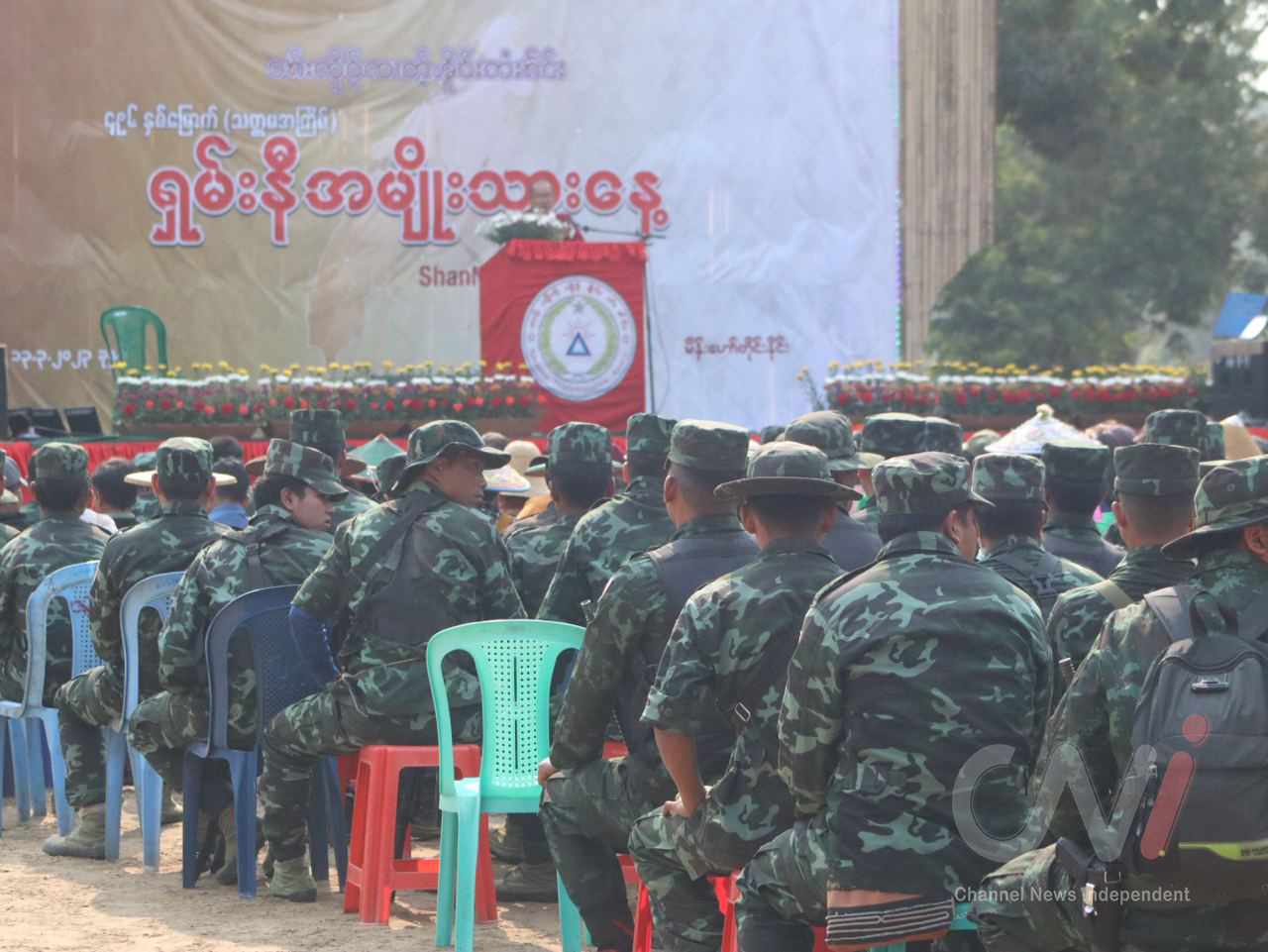
- By CNI
- Category: English Section
- Hits: 838
CNI News
15 Mar 2023
The 496 anniversary (seventh) of Shanni National Day was held at an area controlled by the Shanni National Army in Homalin in Sagaing Region on 13th March, 2023.
The ceremony was organized with the aim of inspiring Shanni patriotism and unity and achieving development of Shanni people.
Shanni national day falls on 12th Waning of 888 ME (2079 RE, 1621 SE, 1527 BC) and the ceremony is held annually.
The SNA has been launching an armed struggle for autonomy.
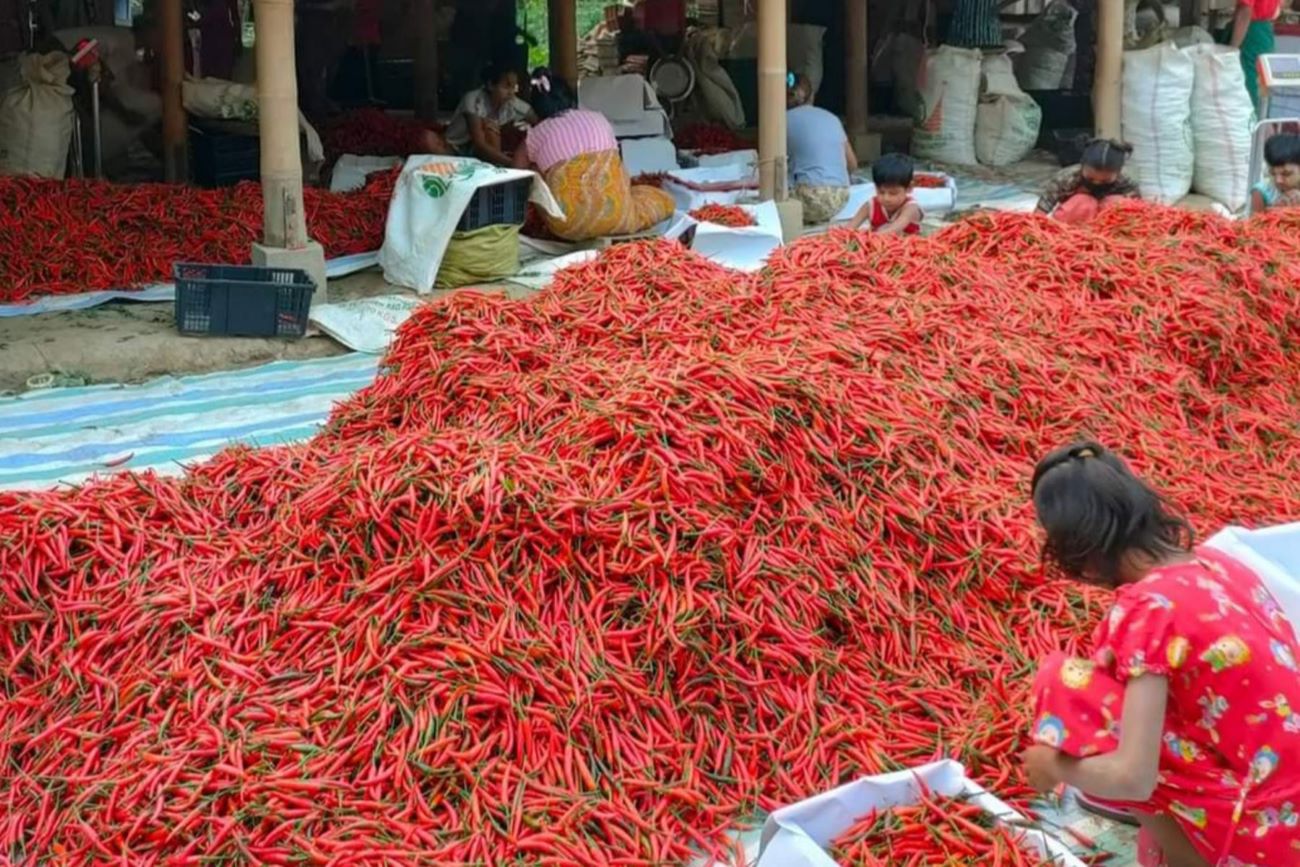
- By CNI
- Category: English Section
- Hits: 1206
CNI News
14 Mar 2023
As chili prices are high both in the domestic and export markets in the 2023 chili cultivation season, chili farmers have been able to reap profits this year, according to farmers.
At present, wet chili prices stand at more than MMK 3,000 per viss and wet chilies are exported to China and Thailand, Chili Farmer Ko Min Khaing from Ayeyarwady Region, which has been selling chilies to exporter since the beginning of the chili harvesting season, told the CNI.
He told the CNI, "Chili prices have been hovering above MMK 3,000 per viss for nearly a month. Chili prices first rose and then dropped to MMK 2,000 per viss for five or six days. Then, the prices have risen again gradually. High quality chillies can even fetch as much as MMK 4,200 per viss. Normal quality chili prices have been hovering above MMK 3,000 per viss. During previous years, we did not get such prices. We have been selling chillies unceasingly since the harvest. Dried chili prices have also risen to over MMK 10,000 per viss or more than MMK 100,000 per viss. Farmers have been able to reap profits. This is the best year for chili farmers."
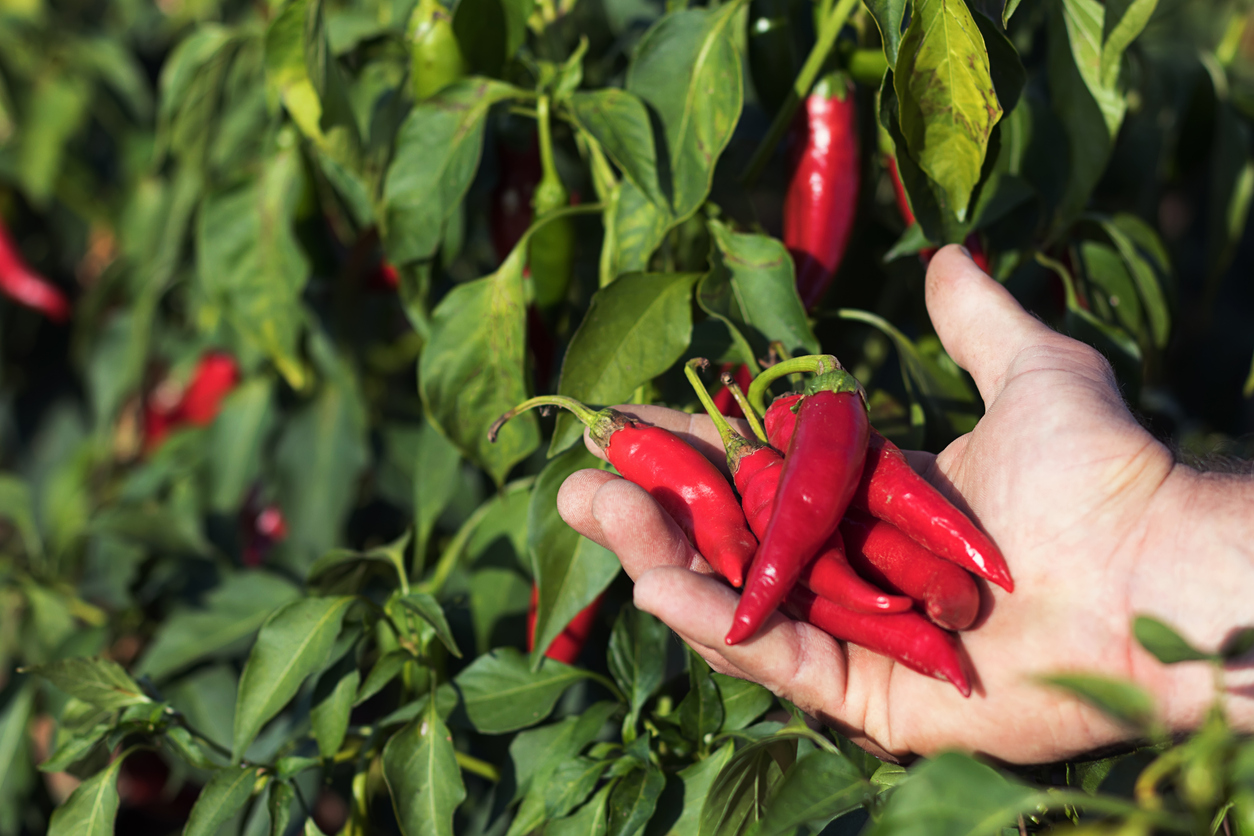
Chili plants
In 2020-2021, wet chilie prices stood between MMK 1,100 and MMK 1,200 per viss and dried chilies were traded between MMK 3,700 and MMK 3,800 per viss.
In 2023, wet chili prices hit between MMK 2,500 and MMK 420 per viss while dried chili prices are as high as more than MMK 10,000 per viss.
Although chilies require more fertilizer and pesticide than other crops, chili farmers, whose plantations were not destroyed by pests, have been able to enjoy profits as much as MMK 3 million per acre due to high prices, according to a chili farmers in Ayeyarwady Region.
He said, "Chili farmers, who spent between MMK 2.5 million and 3 million per acre, can get a profit of MMK 4 million per acre at the current prices. Profits also depend on feeds and care of plants.
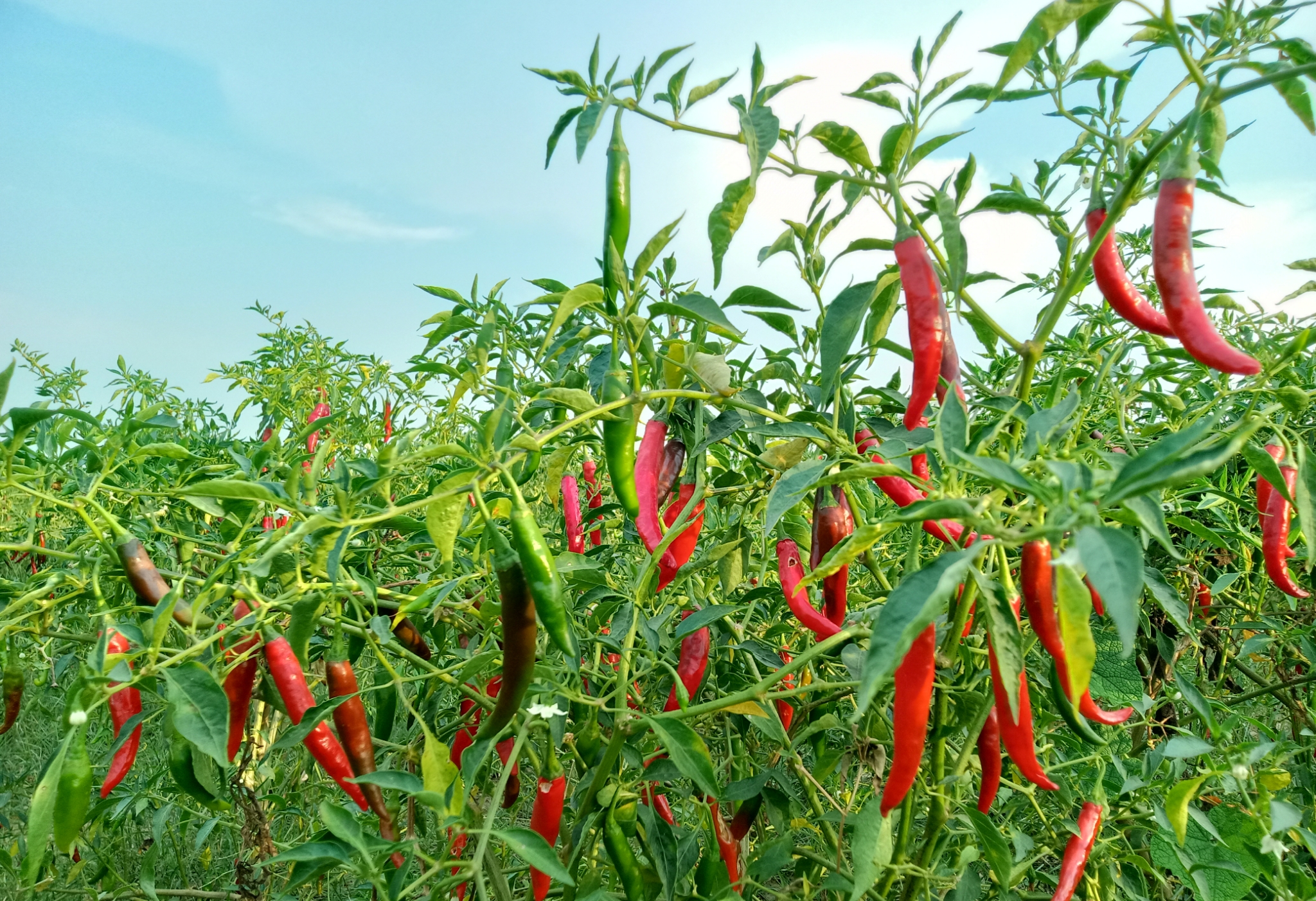
A chili plantation
Those who took care of their plans can enjoy a profit of as much as MMK 4 million per acre. As far as I know, no chili farmers suffered losses this year.
Myanmar chilies are mainly exported to Thailand, China and Malaysia and commonly cultivated in Ayeyarwady Region and Mandalay Region.
As there are different varieties of chillies, chili farmers will be profitable if they grow export varieties. As chili prices are higher, farmers are likely to expand their chilie plantations in the upcoming cultivation season while somes farmers will carry out chili cultivation instead of the usual crops as some corn farmers are preparing to grow chilies rather than corn, according to chili farmers.
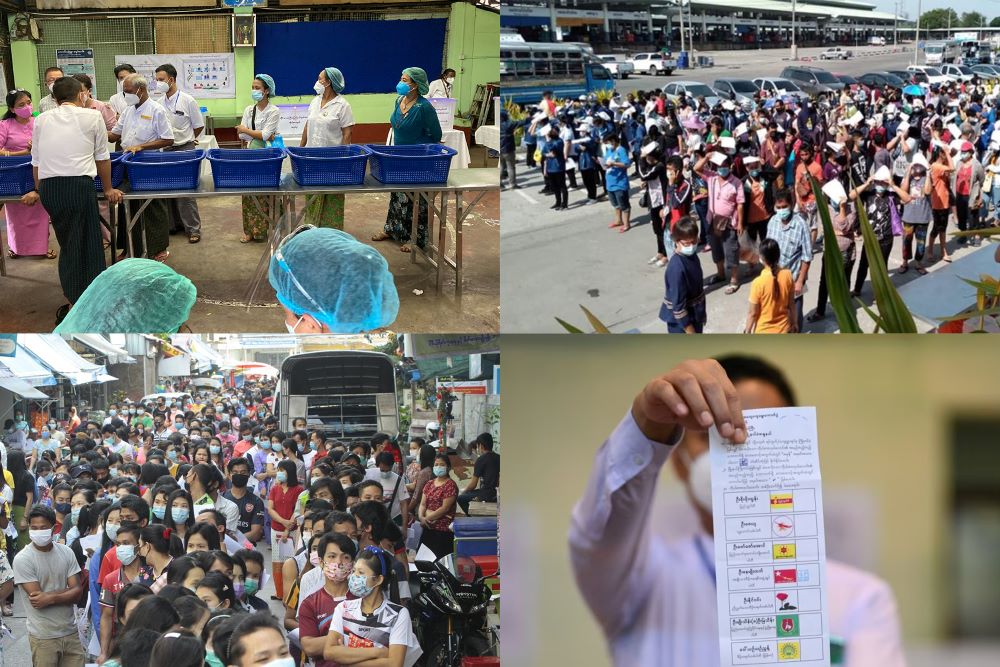
- By CNI
- Category: English Section
- Hits: 724
CNI News
14 Mar 2023
Some observers have been wondering how Myanmar migrant workers in other countries would respond to the elections to be held this year by the State Administration Council.
Most Myanmar migrant workers said that they are indifferent to the elections scheduled by the SAC as they think whether elections can be held or not does not have an impact on their lives.
Ko Moe Lay, who has been working in Thailand, said he had already cast his vote in the 2020 general election, he would not go to vote in the elections held by the SAC.
He said, "As we have elected our government, we would not vote again even if elections could be held. A people's government will not emerge from elections held by the SAC because people's power will no be transferred to the people. They are doing everything they want. Now, migrant workers are illegally coming to Thailand and apply for passports and pink cards by spending between Bhat 15,000 and 20,000. Then, they have to apply for CIs by spending between Baht 7,000 and 8,000. Again, they have to extend their visa by spending between Baht 3,000 and Baht 4,000. Not just that, they have to renew their work permits. So, it costs each of them between MMK 3 and 4 million within five months. Frankly speaking, the SAC is incompetent and has done nothing to offer assistance for them effectively. Myanmar nationals are getting into trouble not only at home but also in other countries."
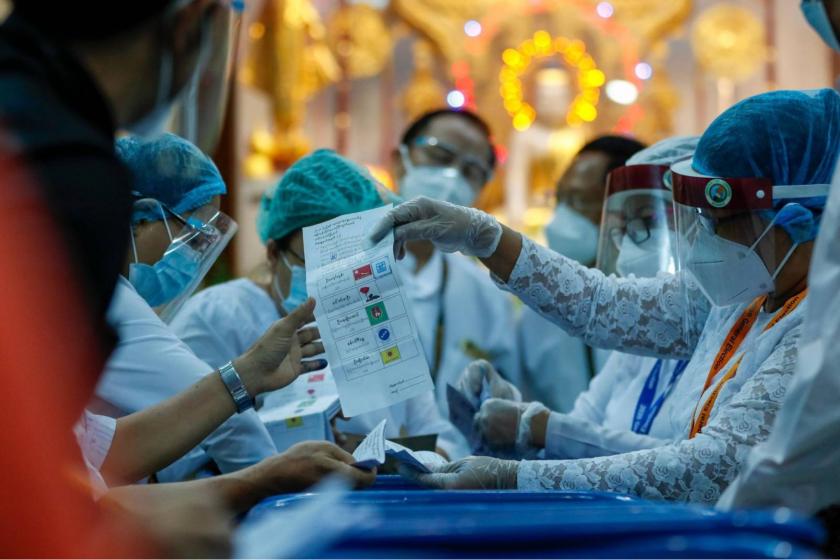
Election results of the 2020 general election are being announced.
As a result, Myanmar migrant workers are of the opinion that their lives will not be different even after the new civilian government, he said.
Moreover, the upcoming elections are likely to intensify the conflicts and the political, economic and social crises will deepen, generating more negative impacts, Director General U Nyi Nyi Lwin of the Centre for Arakan Refugees told the CNI.
He said," If the election cannot be held, our lives will be as they are now. If they could be held, we would get into more trouble. We have nothing to choose. As elections would be held against the will of the people, the country would be more instable and migrant workers in other countries would face more intense hardship. Since the coup, about 200,000 people have left the country because of securiy situation of the country. Even if elections could be held, the National Unity Government will be in place and EAOs and the people will continue to fight against the miliary. Elections cannot be held forcefully against the will of the people. It will lead not to peace but to more conflicts."
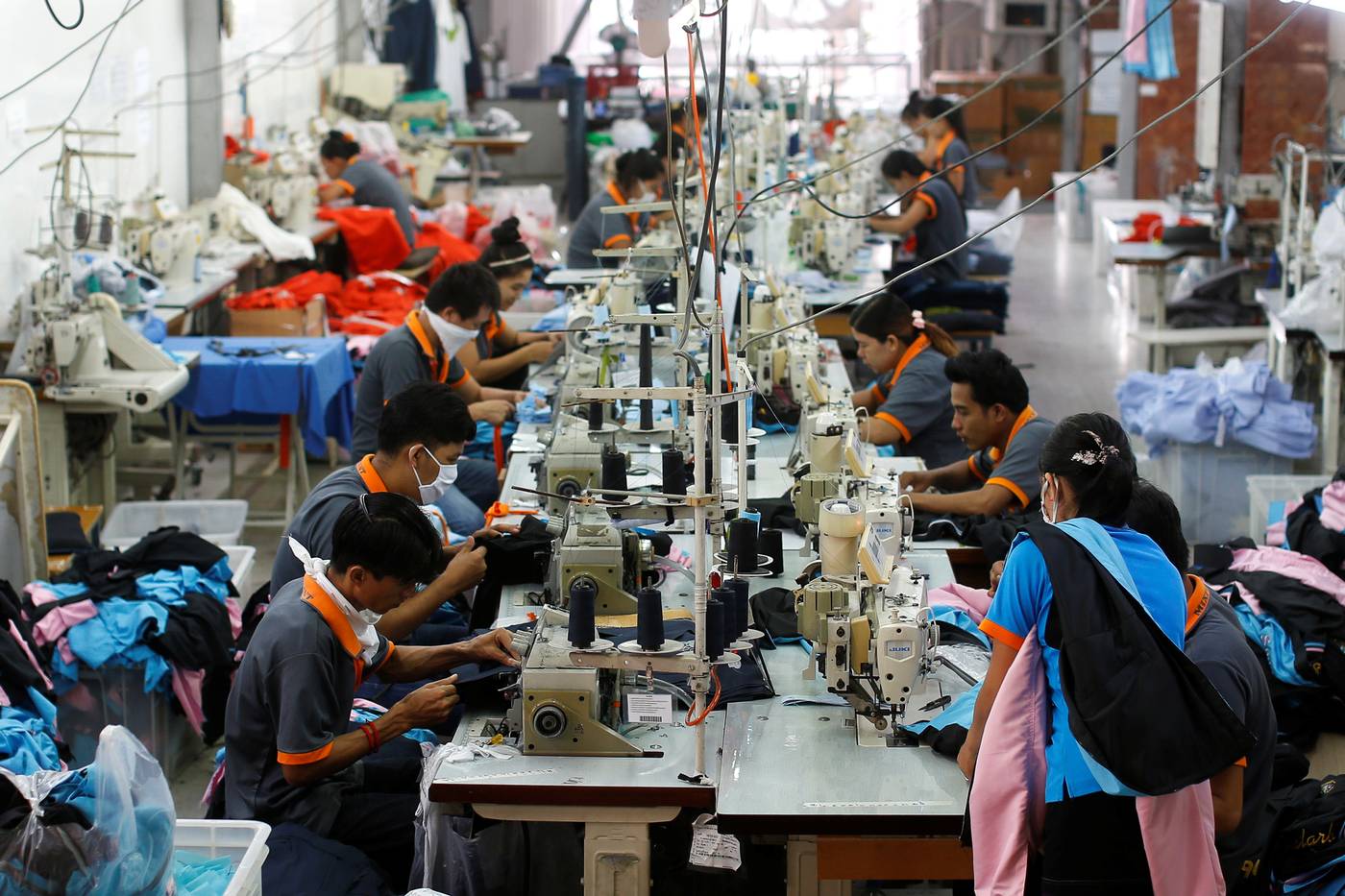
Myanmar migrant workers preparing to leave the country.
In Korea, one of the countries where a large number of Myanmar workers are working, there are different opinions about the elections with some migrant workers feel that the current situation is unfair while others are indifferent to it, Ko Khant Nay Kyi, In-charge Ko Khant Nay Kyi of the Assistance Centre of Migrant Workers in Busan, told the CNI.
As South Korea is a country that promotes democracy and human rights, it is expected that the government will allow Myanmar nationals to continue to stay there after the elections, he added.
He said, "Unlike South Korea, neighbouring Thailand and Malaysia will not be easily decide whether they would allow oppositions to stay in their countries because their democratic norms are very low and they would advance their own national interests. So, they would support the winning side whether it is NUG or the military."
The SAC chairman has promised to hold a general election in 2023 and to transfer state power to the winning party.
Until 8th March, a total of 19 political parties have re-registered with the Union Election Commission, according to the junta media.
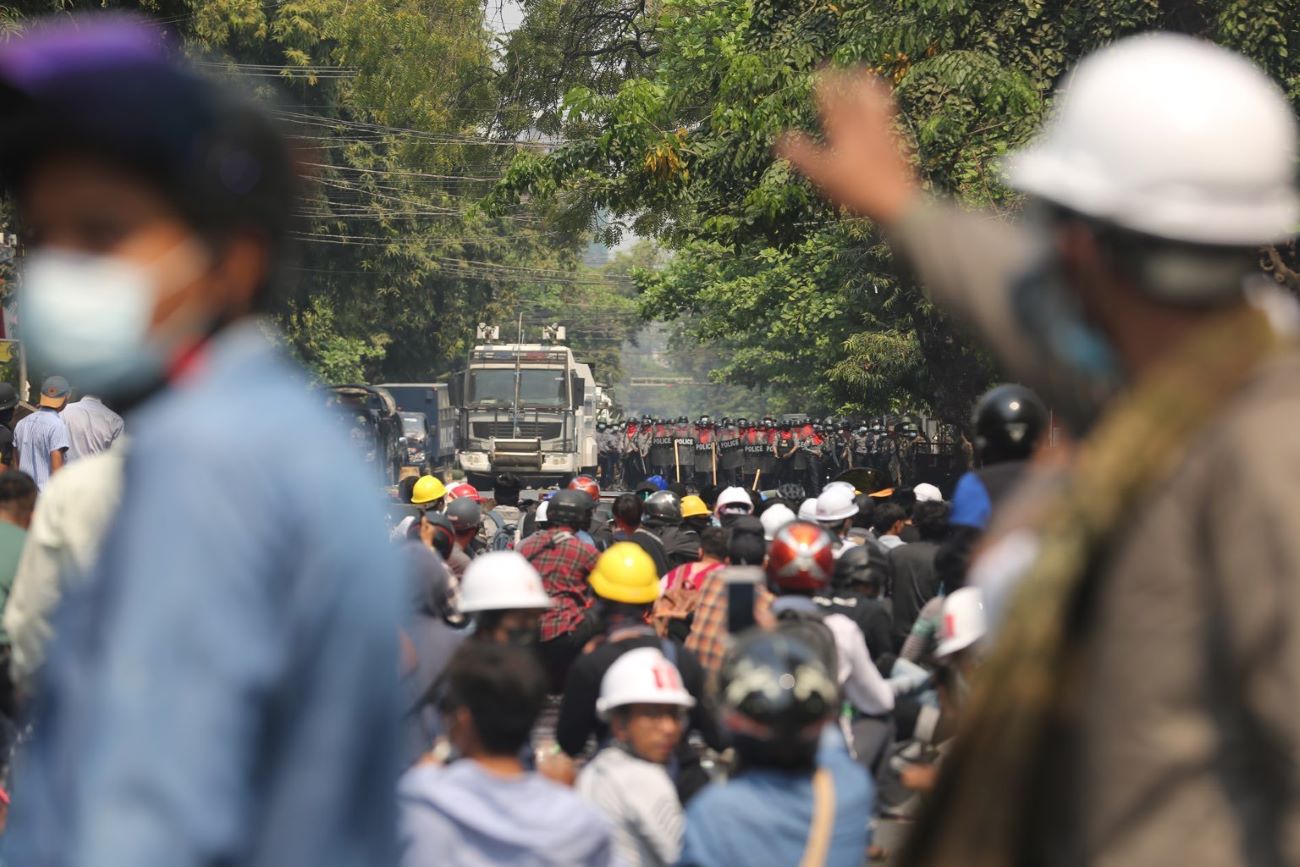
- By CNI
- Category: English Section
- Hits: 772
CNI News
14 Mar 2023
As armed conflicts have erupted in Myanmar for more than 70 years and there are multiple ethnic armed organizations in the country, how to resolve the Myanmar political crisis has raised a question.
Due to political changes after 1s February, 2021, armed conflicts that have been raging in ethnic areas have spread to central Myanmar.
People inside Myanmar will have to resolve their own conflicts by themselves and it is necessary to take the Panglong commitments as a baseline to resolve the conflicts, Chairman Dr Aye Maung of the Arakan Front Party told the CNI.
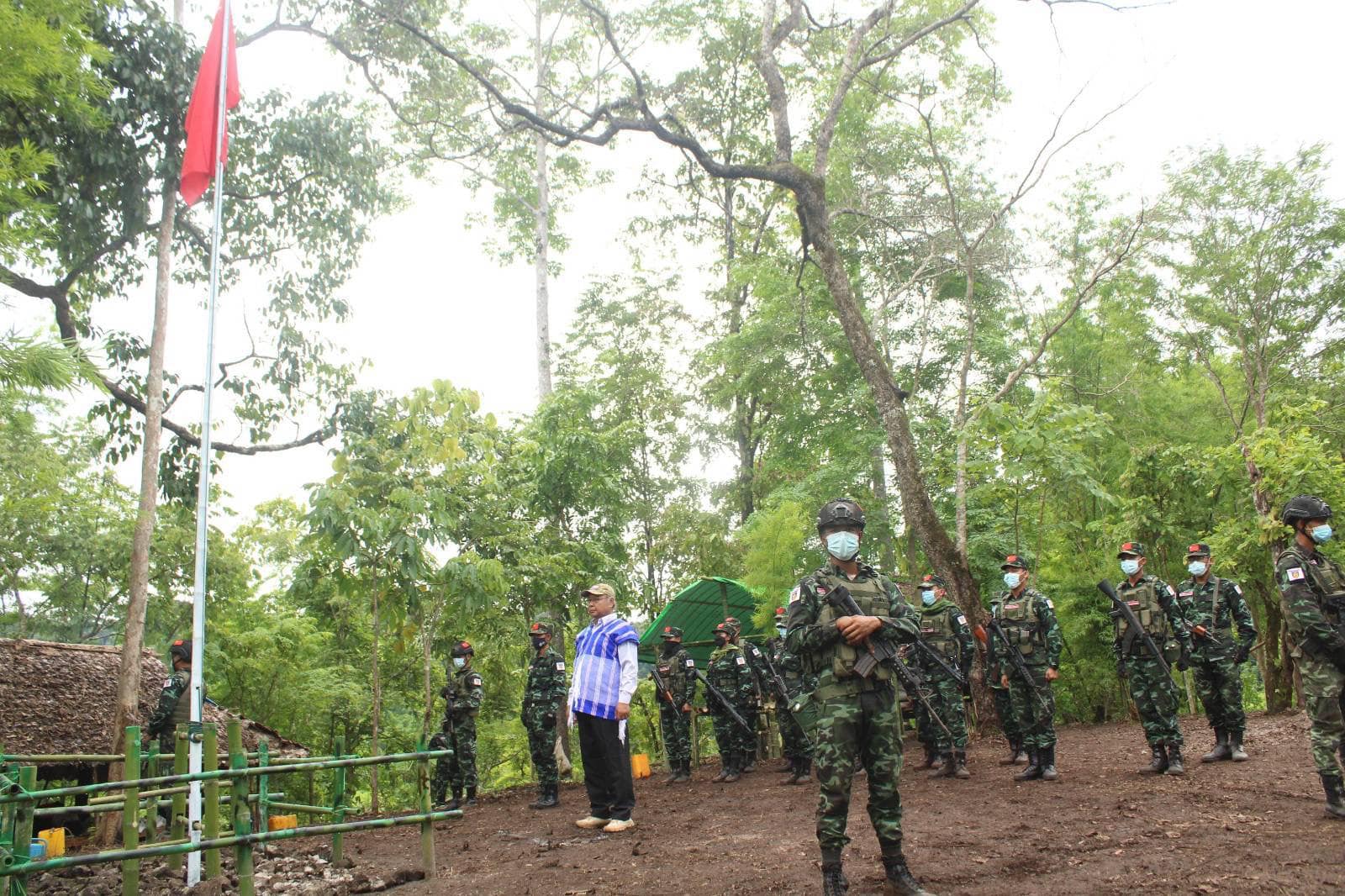
Members of the NUG and the PDF
He told the CNI, "As Myanmar is a multi- ethnic and religious country with various armed organizations calling for ethnic equality, it is very difficult to reach an agreement. The current ASEAN chair Indonesia may explain how the Indonesian army cooperated for creation of a democratic environment and its tactics and political and military concepts to withdraw from its role. In other words, the Indonesian model can give advice to the military. However, it is incumbent on people inside Myanmar to resolve the crisis of the multi- ethnic and religious country which has been engulfed by armed conflicts for more than 70 years. And it is necessary to take Panglong commitments as a baseline. I am referring not to the agreement but to commitments or Panglong concepts that led to the agreement.
Some organizations inside Myanmar, international organizations and the ASEAN are trying out ways and means to resolve the crisis.
Only after toppling the military, can the issues among the anti-junta forces be tackled by themselves, Political Observer U Than Soe Naing told the CNI.
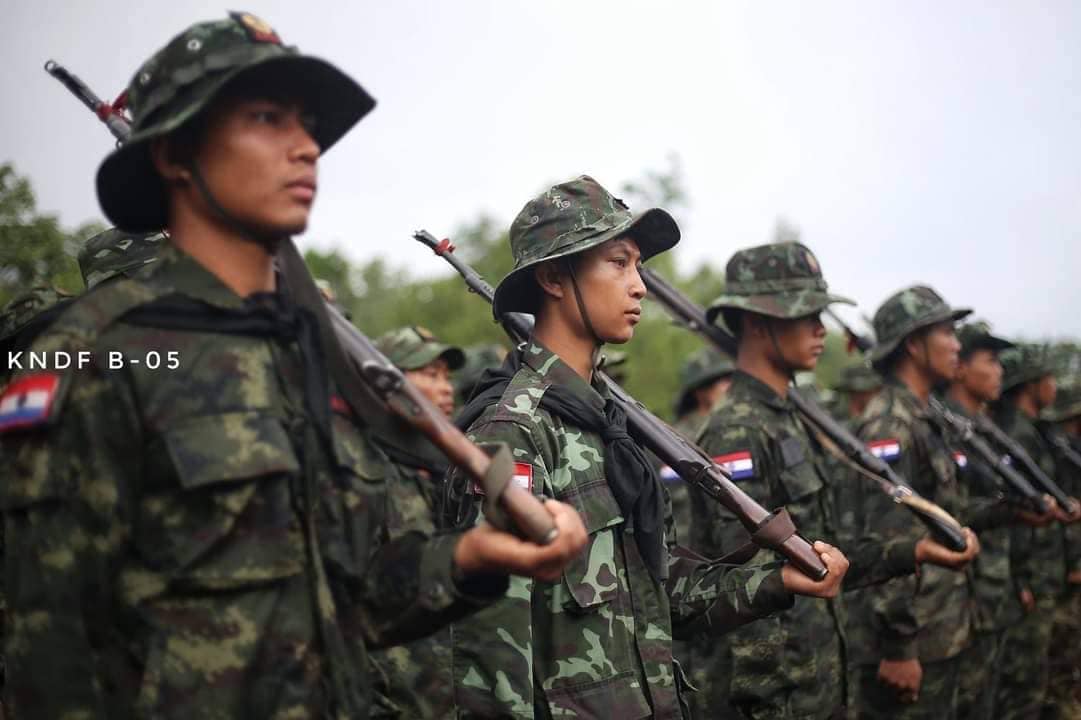
Members of the KNDF
He said, "We will have to overthrow the junta and we will have to address issues among us by ourselves.
At present, fighting has broken out between the Myanmar military and the allied forces of some EAOs and the PDF forces in Kayin State, Kayah(Karenni) State, Sagaing Region and Magway Region.
Due to armed conflicts, the country has faced political, peace, economic, health and social crises.
Then, there have been assassinations under various accusations and the rule of law has been undermined.
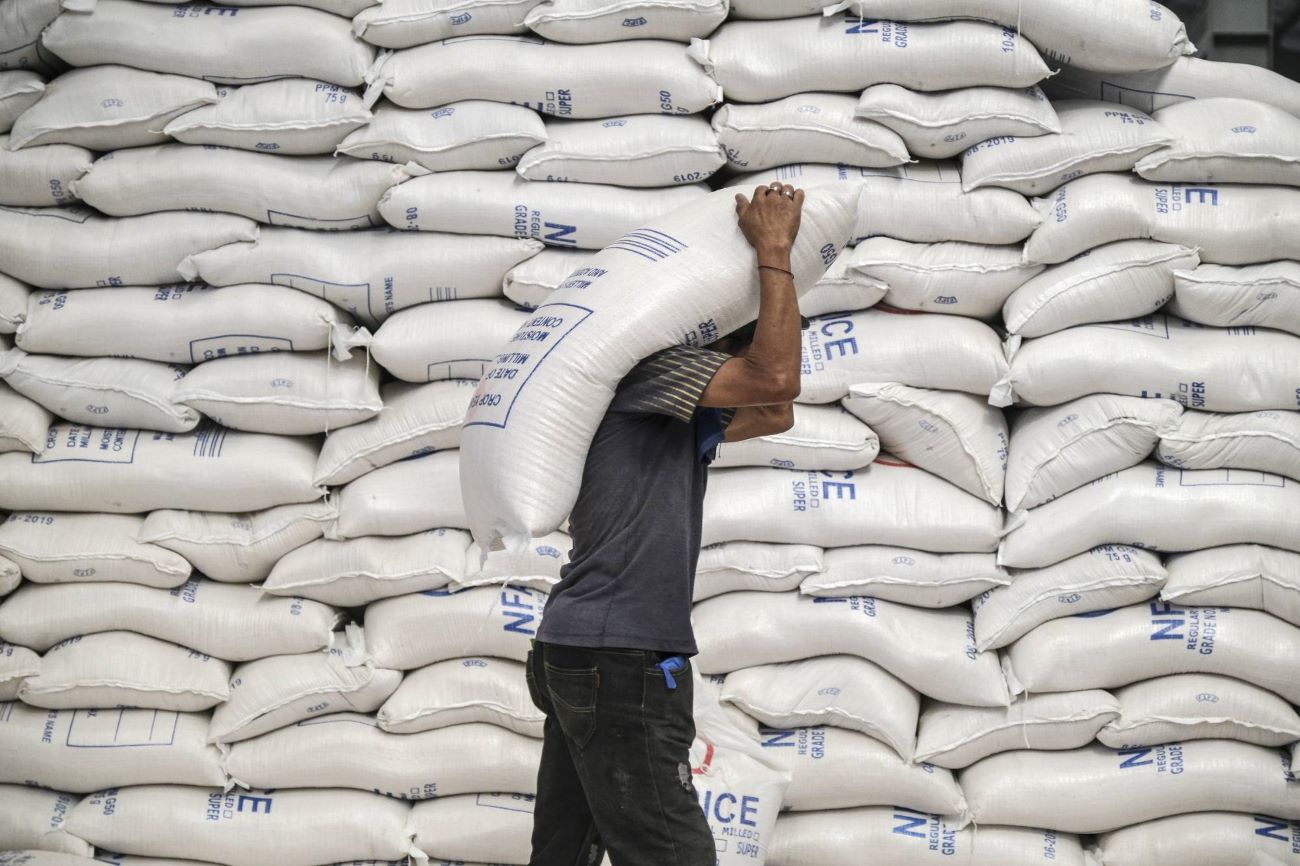
- By CNI
- Category: English Section
- Hits: 884
CNI News
13 Mar 2023
Rice exports to China through the border trade have dropped as Merchants are suffering losses as much as more than MMK 10,000 per bag, according to them.
The profits of border rice merchants have dwindled due to a requirement to exchange 65 percent of their export earnings into MMK at the rate set by the Central Bank of Myanmar as of 1st March.
As a result, the volume of rice exports at the China-Myanmar border has dropped by three-fourths compared to the period before 1st March, Vice Chairman U Min Thein of Muse Rice Exchange told the CNI.
He told the CNI, "The CBM requires rice exporters from the border trade to exchange 65 percent of their export earnings into MMK at the rate set by the CBM as of 1st March. As a result, they have suffered losses as much as MMK 10,800 per bag. As their profits have dwindled, rice exports to China through the border trade has dropped dramatically since 1st March. They will have to export rice through border trade they have already agreed. Before 1st March, between 40 and 50 truckloads of rice was exported to China through the border trade every day. Since 1st March, only nine or ten truckloads of rice have been exported to China."
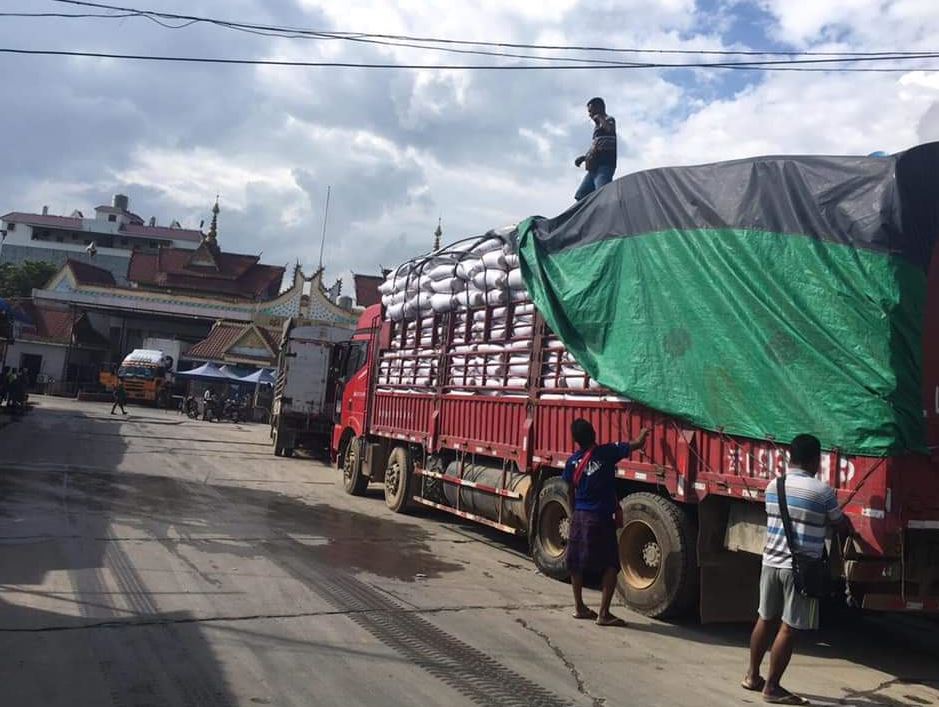
Exporting rice to China
The CBM sets the exchange rate for Yuan at MMK 300 per Yuan but market exchange rates for Yuan are as high as MMK 400 per yuan while the US$ exchange rate set by the CBM stands at MMK 2,100 per dollar but its market rates are as high as MMK 2,800 per dollar.
At present, domestic rice prices are rising but China is importing rice from Myanmar at normal prices. Rice merchants from the border trade are likely to enjoy profits when domestic rice prices fall by more than MMK 10,000 per bag, he added.
He told the CNI, "Chinese merchants will import rice from Myanmar based on their local rice prices, regardless of changes in currency policies in Myanmar. Myanmar merchants can export rice to China if they are profitable. Otherwise, they cannot export rice to China. When domestic rice prices fall in Myanmar by more tham MMK 10,000 per bag, exporters will be able to export rice to China again."
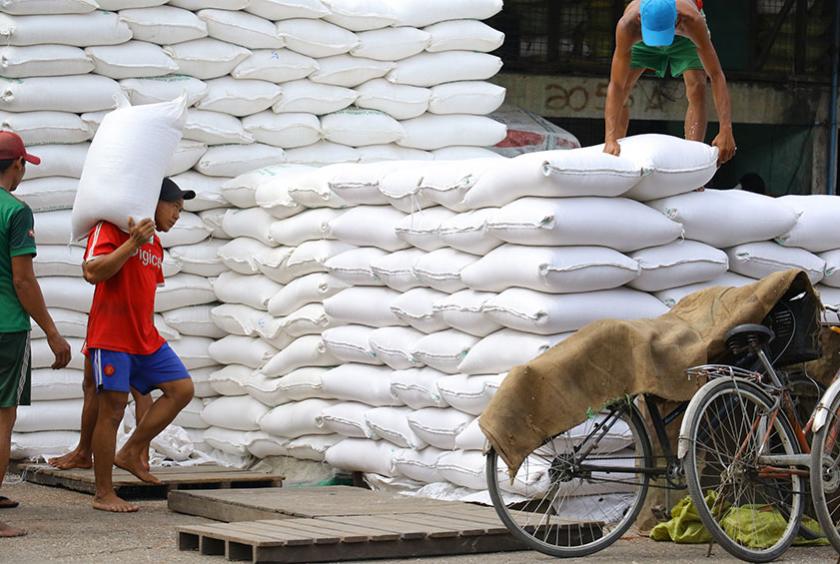
A rice warehouse
The domestic prices of rough rice have risen by MMK 14,000 per bag from MMK 44,000 per bag previously to MMK 58,000 per bag.
Border trade merchants will be able to export rice to China again when domestic rice prices fall, or Chinese domestic rice prices rise or the CBM lifts the requirement to exchange 65 percent of their export earnings into MMK, according to border traders.

- By CNI
- Category: English Section
- Hits: 704
CNI News
13 Mar 2023
One of the hotly debated issues in the Myanmar political circle has been what kind of political landscape would emerge if elections could not be held as planned despite the fact that the State Administration Council said it would hold a general election in 2023.
The SAC chairman vowed to hold the general election in 2023 and to hand over state power to the winning party.
On the other hand, some political observers are of the view that the possibility of holding elections has dwindled by the on-going armed conflicts and the general election is likely to be postponed.
If the general election could not be held, the SAC would continue to grasp the state power, Chairman Dr Aye Maung of the Arakan Front Party told the CNI.
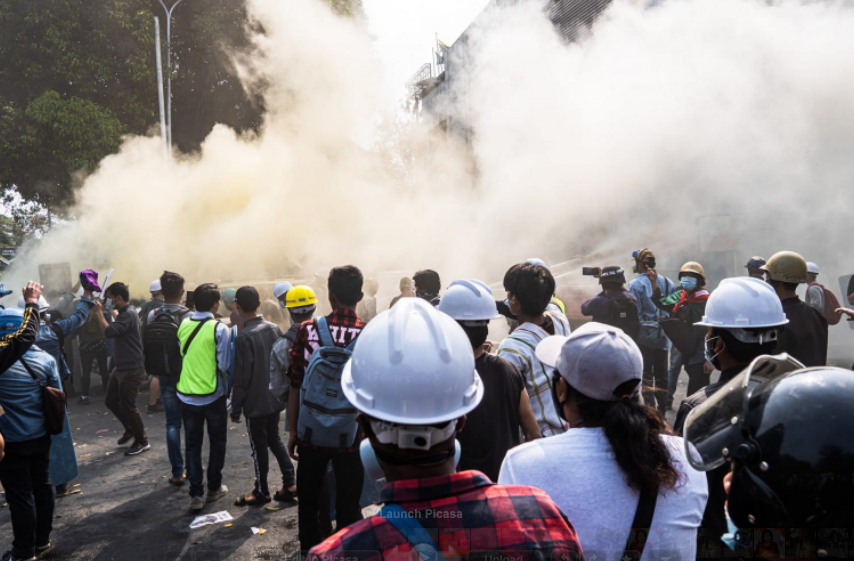
A demonstration calling for democracy.
Dr Aye Mang told the CNI, "There are 20 townships which are not included in the list of 65 townships where stability and security cannot be guaranteed. How long will it take to effectively restore security and stability in these townships? If elections could not be held in these townships, the state of emergency will be extended for another six months under section 425 of the constitution. If the elections could not be held after that, would they declare a fresch state of emergency for one year under section 410 and section 417 of the constitution? They could take such measures under the constitution. Would you disrupt the elections or offer help to hold them? Whether the ASEAN would recognize the election is the problem of the ASEAN. Whether the people would recognize the elections is the problem of the people. Whether the SAC would accept the elections is the problem of the SAC. If the elections could not be held, the SAC would continue to grasp the state power.
Under section 25 of the political parties registration law, political parties are required to be re-registered within 60 days from the enactment of the law in accordance with the law and rules and failure to do so will lead to cessation of relevant politically spontaneously, according to the law enacted by the SAC.
At present, some politicians have reportedly re-registered their parties with the Union Election Commission.
The SAC would hold the elections it promised without fail, Chairman Sai Aik Paung of the Shan and Nationalities Democratic Party told the CNI.
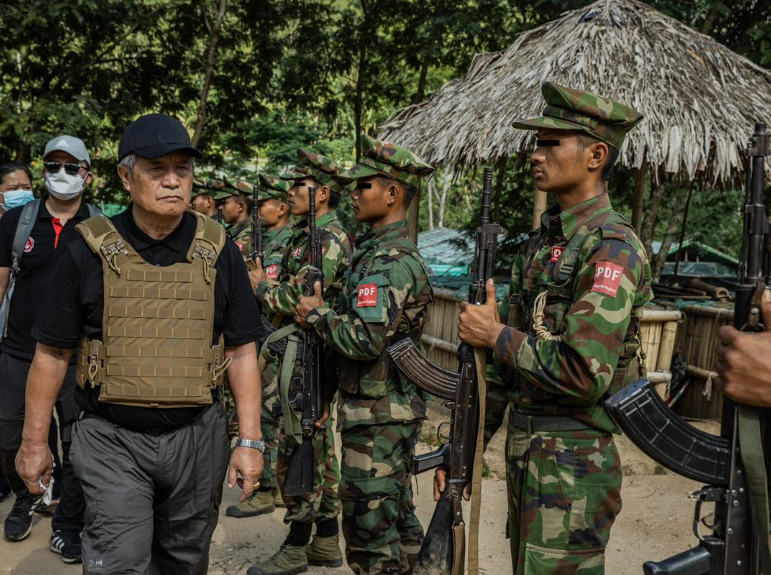
Members of the NUG and the PDF.
He said, "We should think about the elections not negatively but positively. The SAC chairman has vowed to hold the elections and he will respect his promise. There is still enough time to hold the elections. Wait and see positively."
It was difficult to predict whether the elections would be held or not under the current political circumstances, Spokesperson Naing Than Shwe of the Mon Unity Party told the CNI.
He said, "The state of emergency has not ended. I think the elections will be held but I cannot predict how they will be held exactly because the military is planning to conduct a population census. However, it is difficult to predict the details."
The National Unity Government has vowed to disrupt the elections to be held by the SAC as its political exit.
However, other political parties and politicians said the election would be a political exit for the country and should support them even if they could not support the SAC.
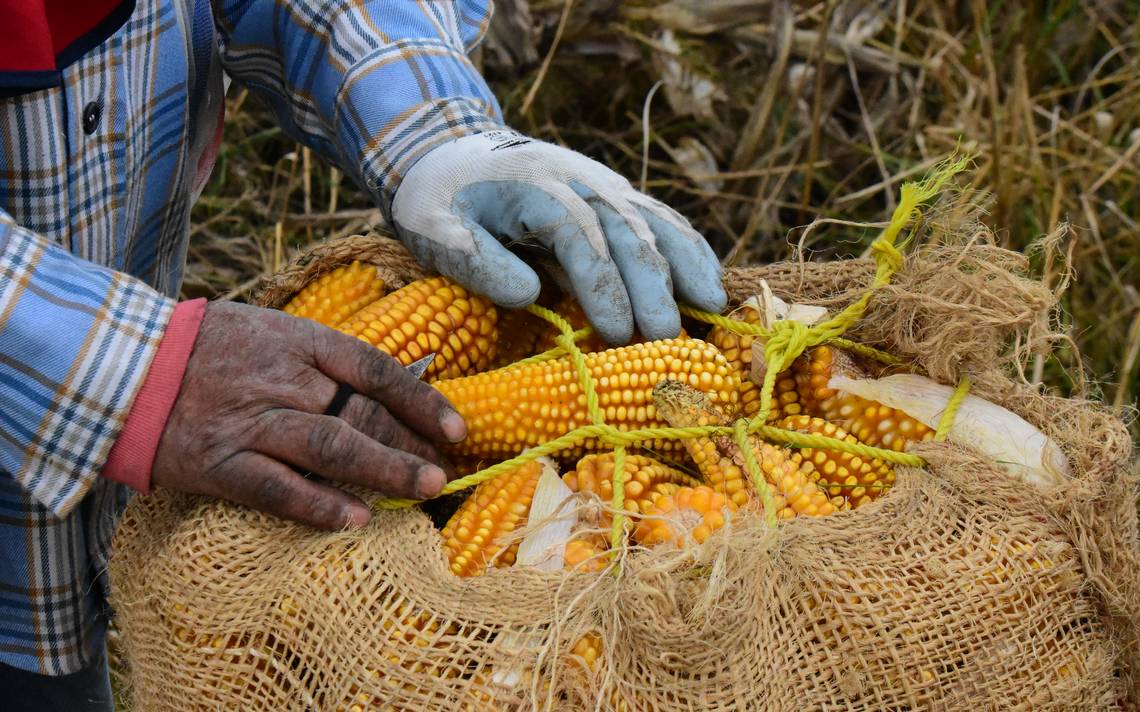
- By CNI
- Category: English Section
- Hits: 1075
CNI News
10 Mar 2023
It was reported that prices of corn exported to Thailand under the duty free system dropped by over MMK 100 per viss recently, according to the sources in the market.
The decreasing prices are attributed to drops in corn prices in the international market, the depreciation of Baht and high costs of transportation, corn merchants said.
Previously, corn prices in Yangon stood at MMK 1,300 per viss but the prices are likely to MMK 1,190. Although he expected corn prices would drop by about MMK 100, the prices have dropped more than MMK 100, Vice Chairman U Thant Zin Tun of the Myanmar Corn Industrial Association told the CNK.
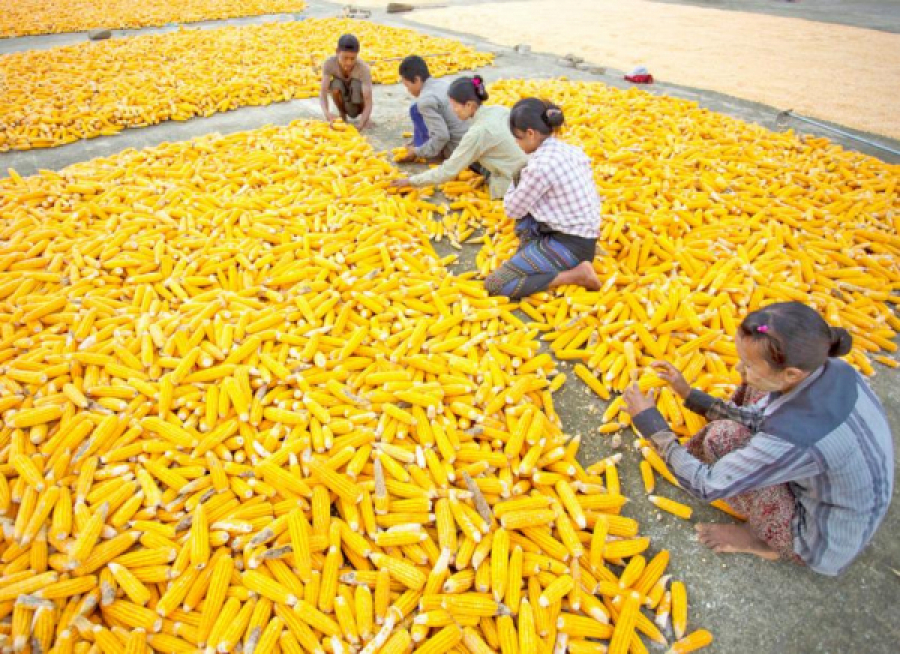
Corn farmers.
He said, "Corn prices have dropped by about MMK 100 per viss due to high costs of transportation, depreciation of Baht and decreasing prices of corn in the international market. The price dropped from MMK 1,300 per viss in Yangon and MMK 1,400 per viss in Myawady previously to MMK 1,190 per viss in Yangon at present. I thought the prices would drop by MMK 100 per viss but they have dropped more than MMK 100 per viss. As I said, the prices have dropped due to high costs of transportation, depreciation of Baht and falling price of corn in the international market."
Although corn prices have dropped, farmers will not suffer an impact as they don't have corn in their hands. Even if some farmers still have corn, they will not suffer losses for cultivation costs until prices drop lower than MMK 1,000, Secretary Ko Sai Lwin Oo of the Corn Industrial Association (Shan State-South) told the CNI.
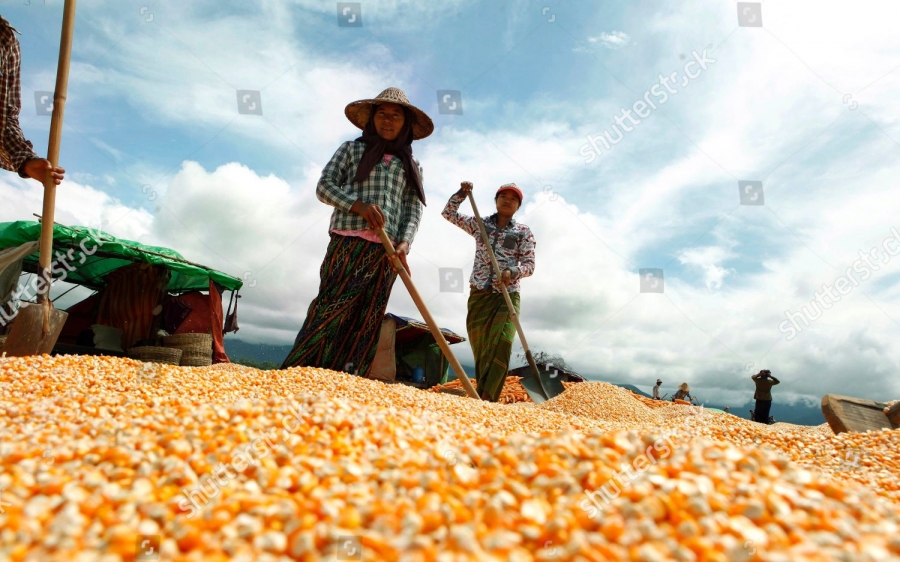
Corn farmers.
He said, "Corn prices have dropped by 10 percent in ten days. At present, farmers have not suffered losses. When they harvested, they got high prices. At present, farmers do not have corn and merchants have stored it. Farmers will not suffer losses as long as the prices drop lower than MMK 1,000 per viss.
At present, corn from Myanmar is exported to Thailand with the exemption of customs duties through border trade and to China, Vietnam, India and more the 70 countries through mercantile trade.
Although corn has been permitted to export to China through the GACC, corn prices in Myanmar is higher than the international prices and is of low quality, exports of corn to Chins have been halted for three months, according to corn merchants.
In 2023, Myanmar will produce 3 million tons of corn and will export 2 million tons, according to the association.
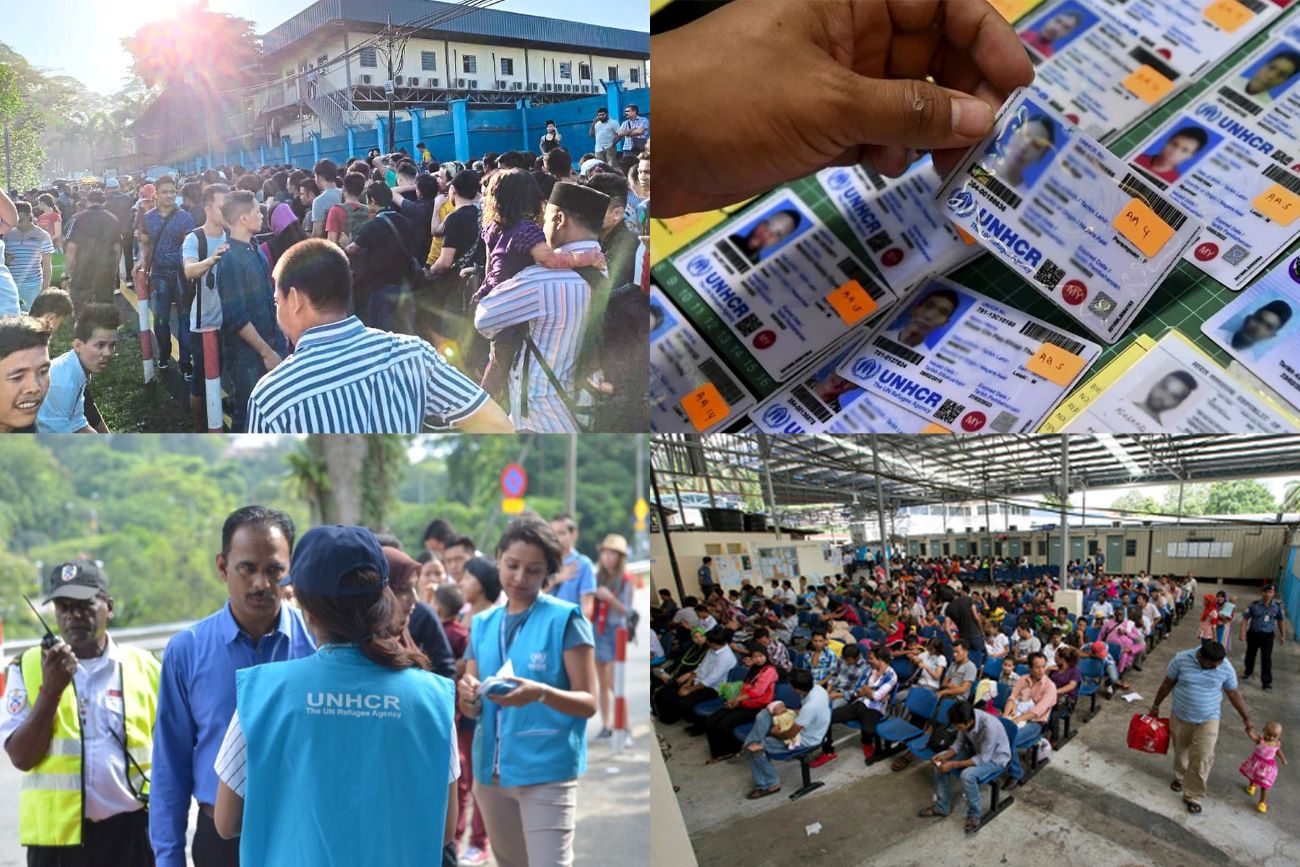
- By CNI
- Category: English Section
- Hits: 1082
CNI News
10 Mar 2023
The issuance of UNHCR cards and related documents will be suspended for one month until 30th April, 2023 for technological upgrades, according to a statement released by the UNHCR Malaysia.
There were no suspensions like that in the past and it causes difficulties for ethnic refugees from Myanmar, Director General U Nyi Nyi Lwin of the Centre for Arakan Refugee told the CNI.
He told the CNI, "There is an enormous impact because the immigration and the police will arrest those who do not have the cards and it is impossible to try to release them. Refugees will face difficulties, arrests, health problems, free movement and unemployment. If they have UNHCR cards, they have access to medical treatments and a 50 percent discount for treatments. Some refugees have to stay in hospital for months or undergo surgical operations and spend as much as 50,000 Ringgits. It is difficult to hospitalize them without UNHCR cards and even if they have access to hospital care, it costs a lot of money for them."
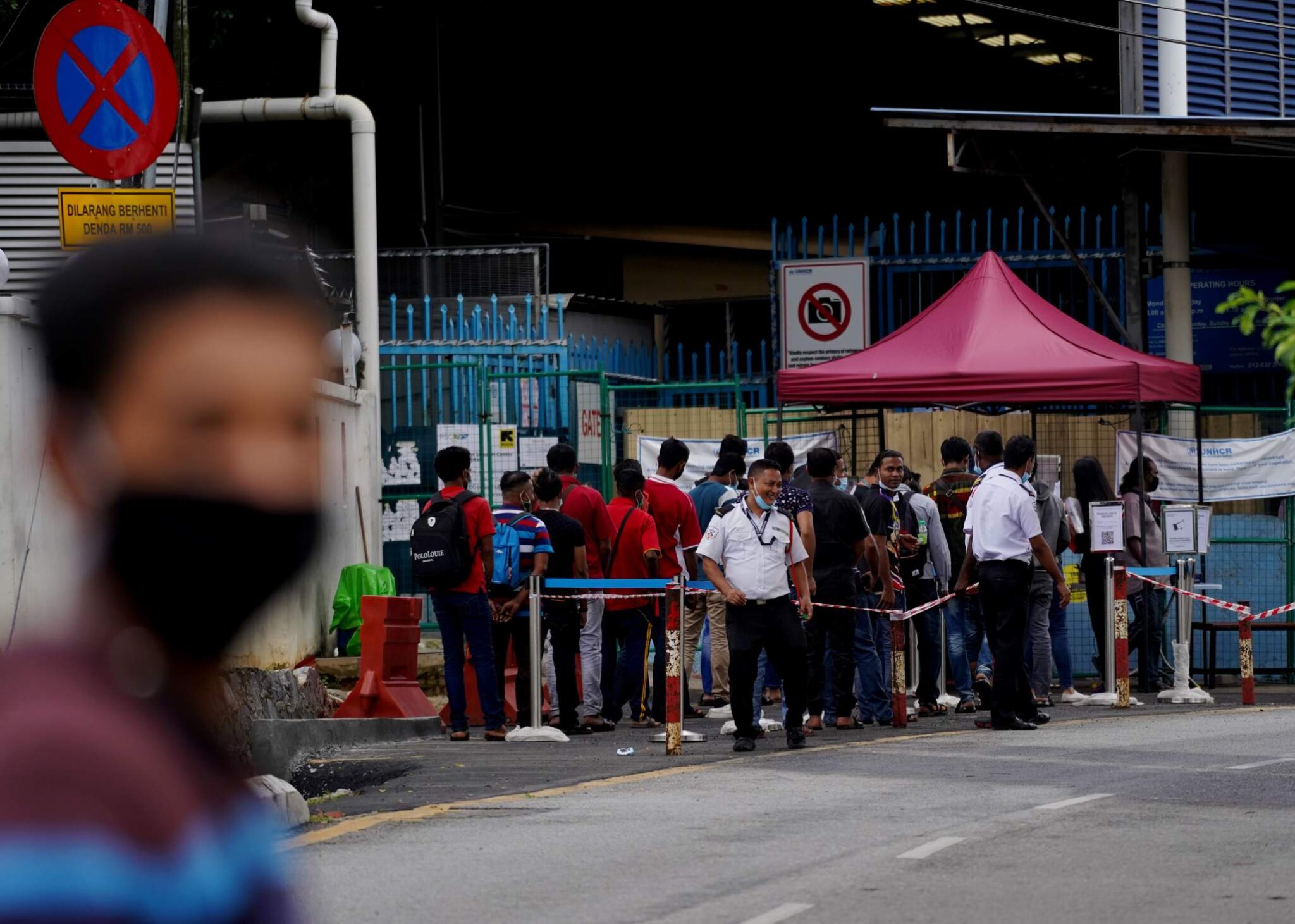
Myanmar workers in Malaysia.
The issuance of UNHCR cards and related documents will resume as of 1st May but it was reported that refugees are allowed to apply for such documents during the suspension.
There are difficulties in applying for the documents as usual and only about one percent of applicants can get the documents.
An official from the Alliance of Chin Refugees said, "There is no discrimination against foreigners. However, the UNHCR is very slow in issuance of Refugee Status Determination. We hope that the agency will issue RSD as quickly as possible after the technical maintenance. There are delays in registration. Therefore, refugees from around the world in Malaysia are in great trouble. They don't have access to their safety and health."
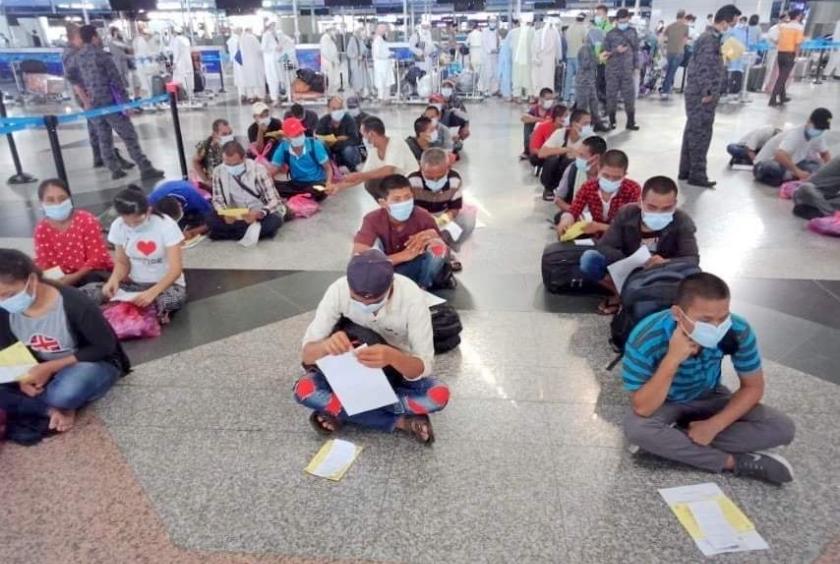
Myanmar workers in Malaysia.
Although there were negotiations between the new Malaysian government and the UNHCR, there has been no official announcement concerning refugees, according to ethnic organizations.
Authorities have been intensifying the arrest of undocumented migrants and ethnic refugees from Myanmar are required to be cautious when the issuance of UNHCR documents, ethnic organizations have warned.
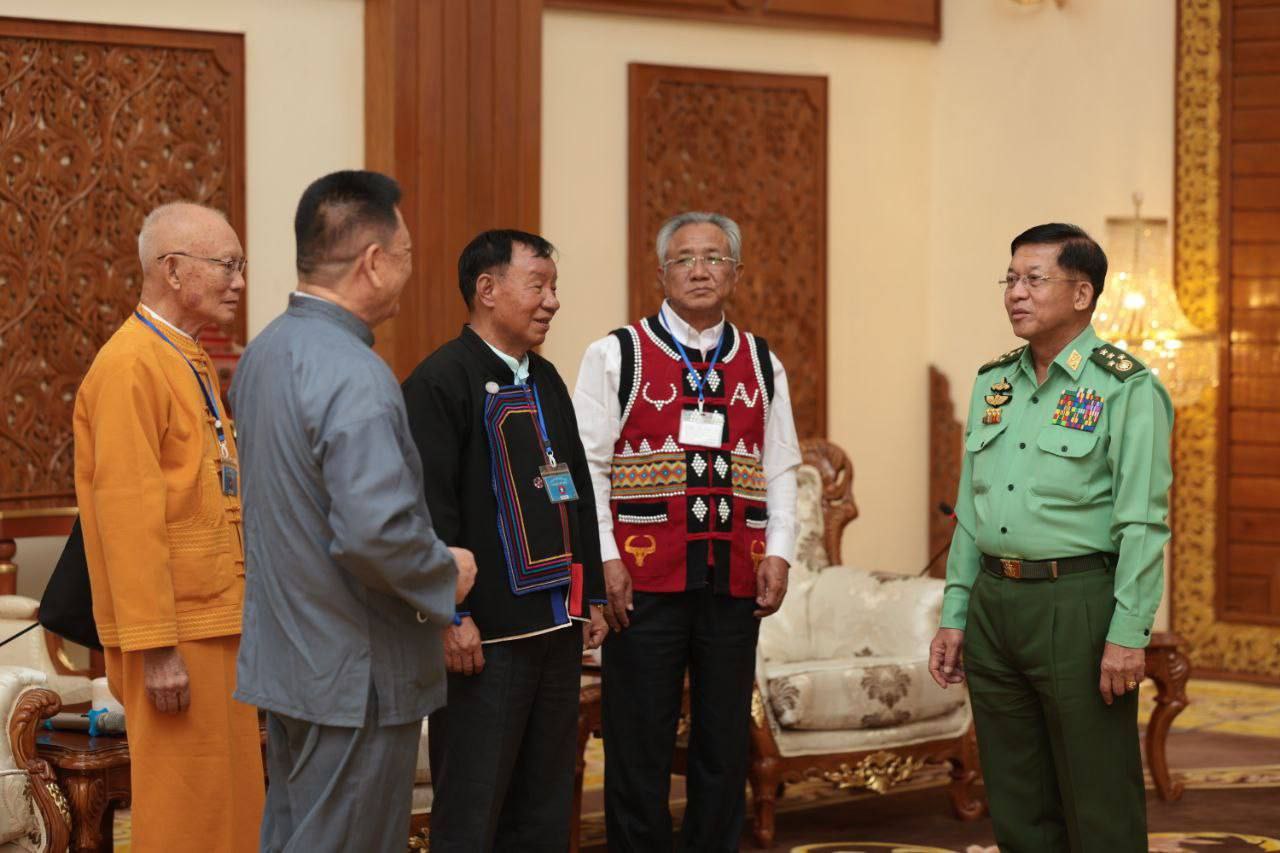
- By CNI
- Category: English Section
- Hits: 692
CNI News
9 Mar 2023
Ethnic armed organizations that are holding peace talks with the State Administration Council should be persuaded to join the revolution together with the National Unity Government, Political Observer U Than Soe Naing told the CNI.
Peace talks are just to prevent some EAOs from joining the NUG, he added.
He told the CNI, "The junta has been holding peace talks as usual. It has become obvious recently. The junta holds peace talks with smaller EAOs whenever armed conflicts intensify. It is just trying to prevent EAOs from working together with the NUG. As this will not contribute to the Spring Revolution and they should be persuaded to join the revolution."
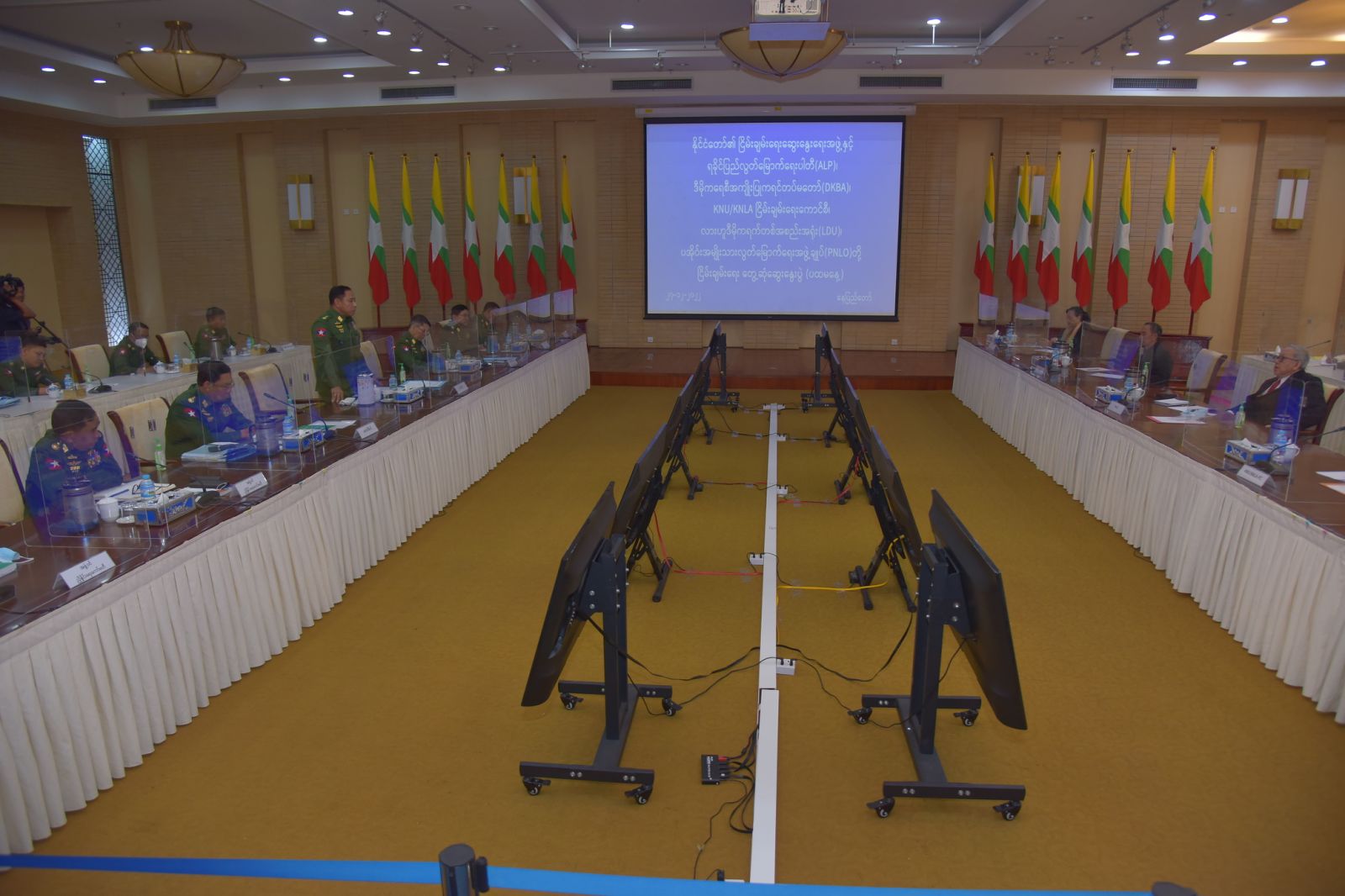
Leaders of the DKBA, the KNU/KNLA-PC, the PNLO, the ALP and the SSPP meet the NSPNC.
Signatories to the Nationwide Ceasefire Agreement including the RCSS/SSA, the NMSP, the DKBA, the ALP, the KNU/KNLA-PC, the PNLO and the LDU are holding talks with the SAC.
Similarly, EAOs such as the UWSA, the NDAA and the SSPP/SSA, which has not signed the NCA, are also holding peace talks with the SAC.
Political Observer Dr Hla Kyaw Zaw said," The junta will do its job. All the problems in Myanmar are created by the junta. It is sowing the seed of disunity among us. The other day, an ethnic leader said problems among us are created by the junta and we can resolve the issue when the junta has been overthrown. I agree with him."
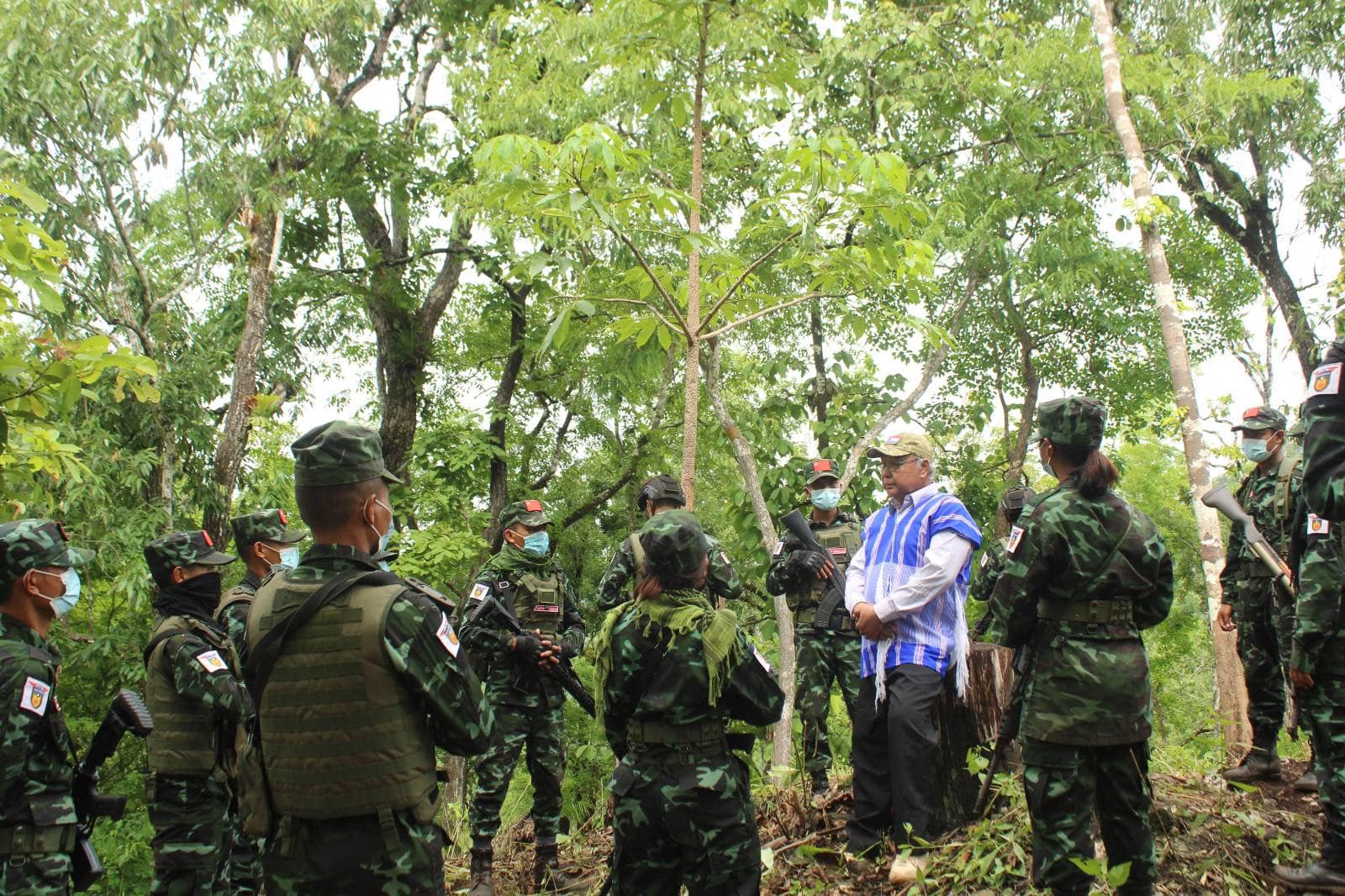
The NUG and the PDF.
The junta declared a state of emergency on 1st February, 2021 after accusing the NLD government of forming a new government without settling election disputes.
Since then, anti-junta protests and armed struggle by the NUG have emerged.
At present, armed conflicts have erupted between junta forces and joint forces of the PDF and EAOs in Kayin State, Chin State, Kayah (Karenni) State, Sagaing Region and Magway Region.



